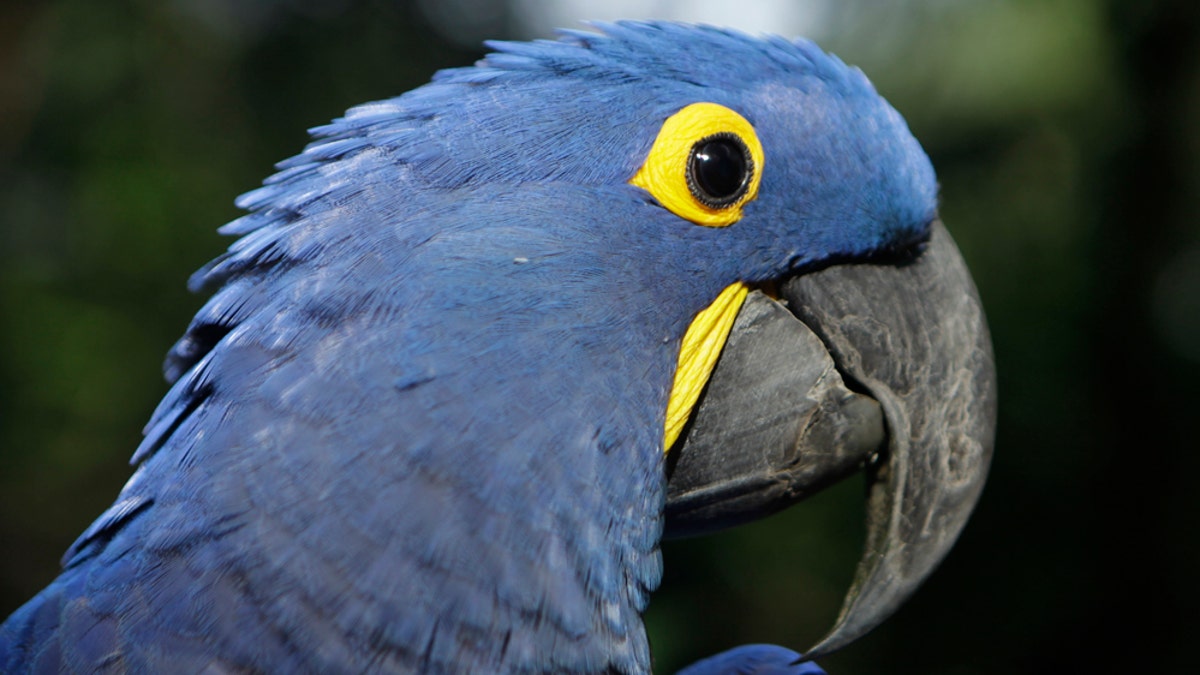
Coco, a blue parrot, is perched on a branch at the zoo in Asuncion, Paraguay, Tuesday May 24, 2011. Coco arrived at the zoo eight years ago when he was retrieved from a band of wildlife traffickers after their arrest. According to the zoo's vet, Coco has since learned to say "hello," and will start to dance at the sound of cumbia music. The veterinarian staff is looking for a partner for the endangered cobalt blue parrot. (AP Photo/Jorge Sanez) (AP2011)
To all the female papagayos out there: Coco is available. And he needs you.
The endangered hyacinth macaw is the last known male of his species left in Paraguay. And if Coco doesn't find someone quick, his species could die off.
So the Asuncion zoo in Paraguay is desperately seeking a mate for Coco,
Scientists estimated several years ago that only 6,500 macaws, known in Paraguay as “papagayo azul,” were left in the wild, mostly in an area of neighboring Brazil that is quickly losing natural habitat for the birds.
Capturing and exporting the macaws is illegal and Coco was sent to the zoo eight years ago after authorities broke up a gang of animal traffickers. Only recently did a DNA test show he's male, zoo veterinarian Cristiane Rainner said in an interview.
To avoid mixing species, the zoo has had to keep him apart from other macaws, which has left him lonely and a bit bored, Rainner said.
"He's quite sociable, although he's only learned to say 'Hello.' But when he hears the cumbia he dances," Rainner said. "The hyacinth macaw is a beauty, but if it doesn't reproduce, that'll be it. Coco is a male and his life expectancy is 80 years."
Coco, who has a yellow circle around his eyes that sets off the rest of his blue feathers, is known to scientists as Anodorhynchus hyacinthinus. He's more or less a cousin to "Blu," the Spix's Macaw that stars in the animated movie "Rio." That species, Cyanopsitta spixii, is all blue and even more endangered than the hyacinth macaw.
But like the bird in the movie, scientists hope to find Coco a mate to rebuild the species.
Because international laws against animal trafficking are now so strict, few institutions in other countries are willing to lend the Paraguay zoo a female, and doing so would require approval from international species protection officials in Geneva, Switzerland, said Cristina Morales, protected species director for the environmental group Birds of Paraguay.
"The ideal is to keep looking for a match in Paraguay," she said.
There are at least two other known hyacinth macaws in captivity in Paraguay, but without DNA tests, it is impossible to know if they are female, and the owners have been reluctant to cooperate, in part because the mating process can take some time, and be a bit rough on females, Rainner said.
Based on reporting by The Associated Press.
Follow us on twitter.com/foxnewslatino
Like us at facebook.com/foxnewslatino
